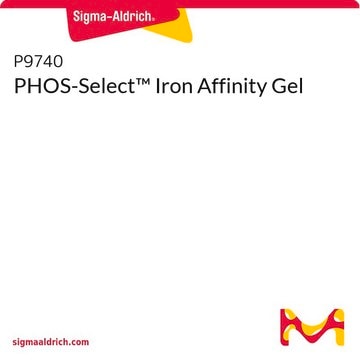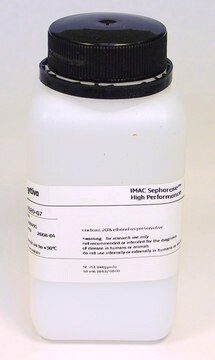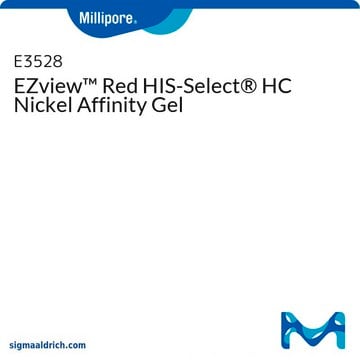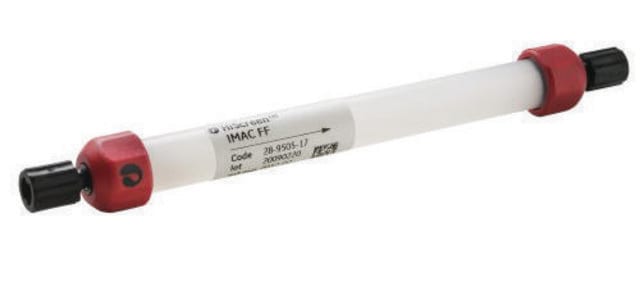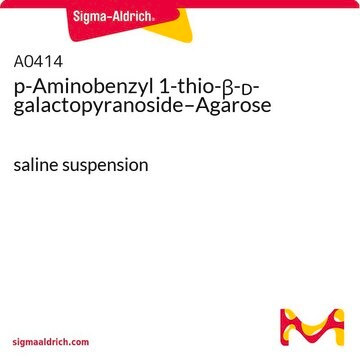I1408
IMAC-Select Affinity Gel
(1:1 suspension in a 30% ethanol solution)
Synonym(s):
Affinity Gel
Sign Into View Organizational & Contract Pricing
All Photos(1)
About This Item
UNSPSC Code:
41106500
NACRES:
NA.56
Recommended Products
Quality Level
form
(1:1 suspension in a 30% ethanol solution)
shelf life
1 yr
technique(s)
affinity chromatography: suitable
impurities
≤0.08 Metal Contamination (μmol/ml packed gel)
matrix
6% beaded agarose
capacity
10-30 μmol/mL binding capacity (Cu+2)
shipped in
wet ice
storage temp.
2-8°C
Application
An immobilized metal affinity chromatography (IMAC) product that can be widely used for purifying proteins, peptides, and nucleotides of interest, most commonly proteins. IMAC-Select utilizes a non-charged linkage chemistry to connect the proprietary quadridentate chelate to the agarose bead matrix. IMAC-Select Affinity Gel is durable and can capture proteins of interest with an affinity to various metal ions such as nickel, cobalt, iron or gallium. A metal free resin allows researchers to add metal of choice, or to use the resin to remove metal contamination from a protein. IMAC-Select Affinity Gel has been used in the affinity purification of kelch-like ECH-associated protein 1 (KEAP1), Wilms tumor gene on the X chromosome (WTX) and glycoprotein G1 tail protein of the andes virus.
Physical form
1:1 suspension in a 30% ethanol solution
Preparation Note
The ethanol used to store the affiinity gel must be removed prior to use to avoid precipitation of buffer salts.The affinity gel is first washed with 1 to 2 volumes of deionized water to remove ethanol. The gel is charged with 2 to 3 volumes of a solution of the desired metal ion at a concentration of 10 mg/mL, and then equilibrated with 3 to 5 volumes of equilibration buffer.
Other Notes
Do not allow the affinity gel to remain in any buffer for extended periods of time unless it contains an anti-microbial agent such as 30% ethanol.
Signal Word
Warning
Hazard Statements
Precautionary Statements
Hazard Classifications
Flam. Liq. 3
Storage Class Code
3 - Flammable liquids
WGK
WGK 3
Flash Point(F)
120.2 °F - closed cup
Flash Point(C)
49 °C - closed cup
Personal Protective Equipment
dust mask type N95 (US), Eyeshields, Gloves
Certificates of Analysis (COA)
Search for Certificates of Analysis (COA) by entering the products Lot/Batch Number. Lot and Batch Numbers can be found on a product’s label following the words ‘Lot’ or ‘Batch’.
Already Own This Product?
Find documentation for the products that you have recently purchased in the Document Library.
Customers Also Viewed
Kris Gevaert et al.
Methods in molecular biology (Clifton, N.J.), 527, 219-227 (2009-02-26)
We present a gel-free proteomics procedure for the specific isolation of phosphorylated peptides from whole proteome digests. Central is the use of diagonal, reverse-phase chromatography which consists of two consecutive reverse-phase peptide separations with a modification step in between. The
Wilms tumor gene on the X chromosome (WTX) inhibits the degradation of NRF2 through competitive binding to KEAP1
Camp ND, et al.
The Journal of biological chemistry, jbc-M111 (2012)
Wilms tumor gene on the X chromosome (WTX) inhibits the degradation of NRF2 through competitive binding to KEAP1
Camp ND, et al.
Test, jbc-M111 (2012)
Yishai Levin et al.
Journal of proteomics, 73(3), 689-695 (2009-11-10)
In order to exploit human blood as a source of protein disease biomarkers, robust analytical methods are needed to overcome the inherent molecular complexity of this bio-fluid. We present the coupling of label-free SAX chromatography and IMAC to a data-independent
The hantavirus glycoprotein G1 tail contains dual CCHC-type classical zinc fingers
Estrada DF, et al.
The Journal of Biological Chemistry, 284(13), 8654-8660 (2009)
Our team of scientists has experience in all areas of research including Life Science, Material Science, Chemical Synthesis, Chromatography, Analytical and many others.
Contact Technical Service